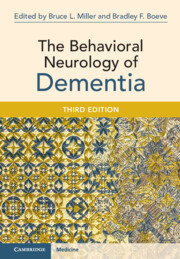Book contents
- The Behavioral Neurology of Dementia
- The Behavioral Neurology of Dementia
- Copyright page
- Contents
- Contributors
- Acknowledgments
- Cover Art
- Abbreviations
- Section 1 Introductory Chapters on Dementia
- Section 2 The Dementias
- Section 3 Treatment of the Dementias
- Chapter 21 Treatment of Alzheimer’s Disease
- Chapter 22 Treatment of Frontotemporal Dementias
- Chapter 23 Treatment of Dementia with Lewy Bodies
- Chapter 24 Delirium Masquerading as Dementia
- Chapter 25 Sleep Issues in Dementia
- Chapter 26 Caregiving in Dementia
- Chapter 27 Legal Issues in Dementia
- Index
- References
Chapter 26 - Caregiving in Dementia
from Section 3 - Treatment of the Dementias
Published online by Cambridge University Press: 17 November 2025
- The Behavioral Neurology of Dementia
- The Behavioral Neurology of Dementia
- Copyright page
- Contents
- Contributors
- Acknowledgments
- Cover Art
- Abbreviations
- Section 1 Introductory Chapters on Dementia
- Section 2 The Dementias
- Section 3 Treatment of the Dementias
- Chapter 21 Treatment of Alzheimer’s Disease
- Chapter 22 Treatment of Frontotemporal Dementias
- Chapter 23 Treatment of Dementia with Lewy Bodies
- Chapter 24 Delirium Masquerading as Dementia
- Chapter 25 Sleep Issues in Dementia
- Chapter 26 Caregiving in Dementia
- Chapter 27 Legal Issues in Dementia
- Index
- References
Summary
This chapter focuses on the challenges and experiences of caregiving in dementia, emphasizing the importance of protecting caregiver health and well-being. It discusses effective communication strategies, provides a list of useful web-based educational resources for caregivers, and explores direct and indirect caregiver support interventions. The chapter highlights the need for better support and resources for caregivers, including access to respite care and palliative care services. It also provides strategies for healthcare providers to better engage and support caregivers. Overall, the chapter emphasizes the need to prioritize caregiver health and well-being in dementia care to improve outcomes for both caregivers and individuals with dementia.
Keywords
Information
- Type
- Chapter
- Information
- The Behavioral Neurology of Dementia , pp. 447 - 465Publisher: Cambridge University PressPrint publication year: 2025
References
Accessibility standard: WCAG 2.1 AA
Why this information is here
This section outlines the accessibility features of this content - including support for screen readers, full keyboard navigation and high-contrast display options. This may not be relevant for you.Accessibility Information
Content Navigation
Allows you to navigate directly to chapters, sections, or non‐text items through a linked table of contents, reducing the need for extensive scrolling.
Provides an interactive index, letting you go straight to where a term or subject appears in the text without manual searching.
Reading Order & Textual Equivalents
You will encounter all content (including footnotes, captions, etc.) in a clear, sequential flow, making it easier to follow with assistive tools like screen readers.
You get concise descriptions (for images, charts, or media clips), ensuring you do not miss crucial information when visual or audio elements are not accessible.
Visual Accessibility
You will still understand key ideas or prompts without relying solely on colour, which is especially helpful if you have colour vision deficiencies.
Structural and Technical Features
You gain clarity from ARIA (Accessible Rich Internet Applications) roles and attributes, as they help assistive technologies interpret how each part of the content functions.
